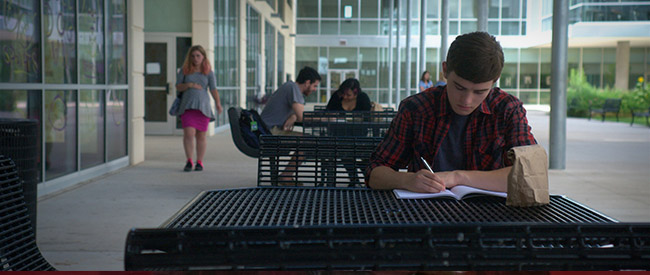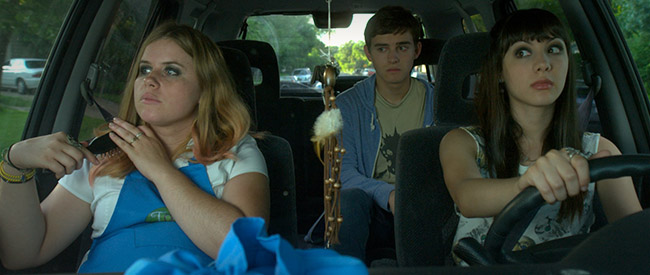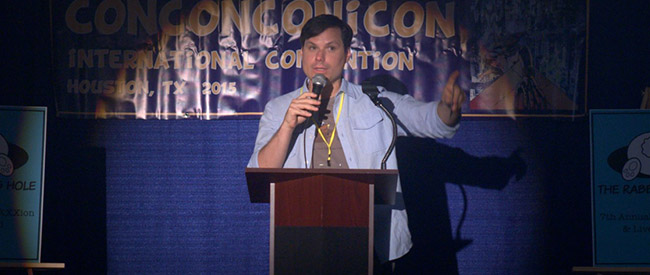Enter writer-director Clay Liford’s new indie comedy Slash—a coming-of-age story centered on high school student Neil, played by Michael Johnston. When not questioning his own budding sexual orientation, Neil’s primary activity is writing erotic fan fiction about a sci-fi action character called “Vanguard”—an offbeat hobby that earns him nothing but mockery from his fellow students.
Eventually, Neil befriends fellow outcast Julia (Hannah Marks) and the two set off on an adventure to a local “slash fic” con to present Neil’s stories to Denis, an esteemed erotic genre fiction tastemaker played by the Michael Ian Black. Filmed in and around Austin, TX, the shoot was produced by Brock Williams and Jason Wehling, along with co-producers Traci Carlson and Steven J. Berger. What’s more, Williams, Carlson and Berger all met as Fellows during the 2014 Film Independent Producing Lab. Slash is playing this Saturday, July 9, at Outfest in Los Angeles—click here for more information. We recently spoke to Williams, Carlson and Berger (minus Wehling) to discuss the film, the convergence of geek and queer culture, the importance of telling a different type of coming-of-age (and coming-out) story and the difficulties of shooting an ambitious idea on a limited budget. Here’s the conversation:
So to start, could you tell me what Slash is and what it’s about? Williams: Sure. Slash is a coming-of-age comedy about a questioning teenage boy who writes erotic fan fiction. The three of you produced the film together. As a creative unit, what attracted you to the world of geek culture? Williams: I met Clay Liford, the writer and director, when he was making the short film [version]. I thought it was really funny and was something I really connected with. Also, I really loved that the script didn’t offer any answers. The main character doesn’t just figure out all of his problems by the end, it’s more about the journey. Clay’s writing is really honest, and I’ve always been attracted to that. The three of us [Berger and Carlson] met at the Film Independent Producing Labs. Carlson: A lot of times you get a girl coming-of-age story, and girls often get the opportunity to not know what they want or who they are. You don’t often see it with boys, but that was one of the things that initially attracted me to [the script]. I really adored Brock and was excited to collaborate with him on something. I’m a pretty experienced technical producer, and I think Brock saw that I could contribute to the actual physical production. We talked about it, and it made perfect sense for me in that moment of my life to come out to Texas and make a movie. Berger: We all really formed an attachment to each other, so much [so] that after this film we were talking about what we could do next together. I think it’s a collaboration that will continue. The great thing about the [Producing Lab] is that [Film Independent] has done such an incredible job of curating not just material, but people—bringing people together who all get it and who are passionate about filmmaking. That was A-number one. Reading the script, the thing that was great was, it’s really an opportunity to tell a coming-of-age story about someone who’s questioning.
I’m curious to know if you guys think there’s any sort of overlap between the geek community and the queer community that’s maybe underrepresented in TV and movies. Williams: Yeah, I think certainly. I have a good buddy, Skip Harvey, who’s one of the main characters in Morgan Spurlock’s Comic Con documentary. Skip actually designed the look of Vanguard, our sci-fi action hero character. He was telling me that recently there’s actually a really big bond between the queer community and the geek community, because of how those communities can all identify with each other and have that struggle [as outsiders] in common. Did you guys go to any actual comic convention or slash-fiction conventions for research? Williams: For the film, we traveled down to Houston to Comicpalooza, which is a big convention they let us film. Actually, first Clay and I went to a small convention that’s pretty new called Haven Con, which is a LGBT con in Austin. We went there in probably 2014 or 2015 and met a bunch of people, and were kind of collecting folks to come out and support us because we had to stage this whole fake convention for the movie. I wanted to ask about that. I’m sure the budget for this wasn’t that big, and something like that I imagine was pretty tricky to pull off. Williams: It took a lot of juggling. Like, kind of nuts. We went for two days and filmed at Comicpalooza in Houston, so we got all of those show floor shots. We had to map out that whole section of the movie. We had three different locations: the convention in Houston, a hotel in Austin for some scenes, and a big—it’s a theater in Austin, but they have a big event space—and we just sort of took it over and built a whole fake floor show, like just a section of the show floor that we used. That whole part of the movie where they’re at the convention, every time they leave a room, or sometimes even walk to another part of the room, it’s a new location. But it all worked out. You also had a pretty amazing cast. How did you guys wind up getting all of the folks in this movie? Williams: We had our casting director that we hired, J.C. Cantu, based in LA and he was casting the big roles. And we started filling in a lot of the smaller roles through people who we’d worked with before. Carlson: It’s funny when you look back, because everybody just feels so right for [their part] and there were so many different versions or iterations of the cast that we talked about or thought might be involved. And I think it might be common for a film of this budget level, they may lose their cast over and over again due to availability. But now I can’t imagine it any other way. Williams: Like, Missi Pyle was one. We had a local Austin actress cast in that role and she got offered a series regular part on The Leftovers, because The Leftovers was shooting in Austin at the same time as us. So she had to take it and drop out. We locked in Missi on Friday and she had to fly out Sunday and start shooting on Monday.
Last question. Slash is headed to Outfest this Saturday, July 9. Why do you think the film is a good fit for this particular festival? Williams: One thing we’ve gotten some feedback from people on is that it’s refreshing to see a questioning kid. I don’t think that’s portrayed very often. The film doesn’t feel in-your-face gay. I don’t even really think of it as a gay film. Our publicist said, when we were going to SXSW, that it almost feels “post-gay” because a lot of younger people and Millennials are much less obsessed with these labels and the need to figure out who everyone is and what they do and put a name to it. Berger: I actually think that this is a really commercial film, and I think the hope that we have is that the film gets to the largest platform possible. I really think it’s going to resonate with a lot of people in the community and I think that people finding the film through Outfest will be fantastic. It’s not just a gay movie. It’s not just a geek movie. It’s not just a comedy. It’s all of these things, and I think that makes it kind of special. Carlson: What makes Slash so unique hopefully for the gay community is the exploration of these sorts of shades of gray within sexuality. It’s not so quick to put people in these boxes of either heterosexual or homosexual. I hope that’s where we’re going [as a society], where things can be explored more openly and we can try not to put people into small little boxes all the time. For more information about Slash check out the film’s website. To learn more about the Producing Labs and additional Film Independent Artist Development programs, click here. To learn more about Film Independent, subscribe to our YouTube channel or follow us on Twitter and Facebook. To learn how to become a Member of Film Independent, just click here.


